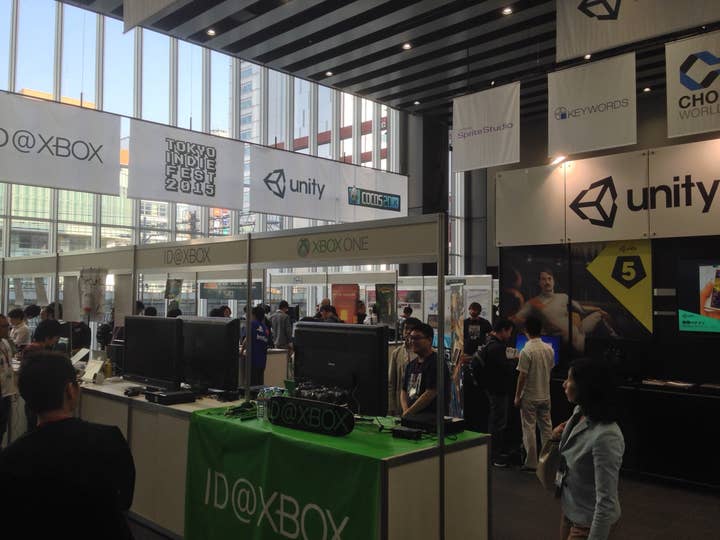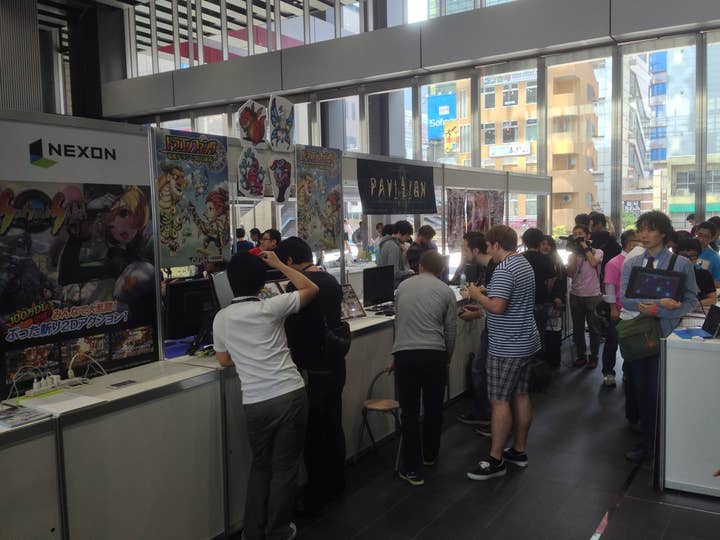Tokyo Indie Fest: Japan's indie scene showing green shoots
But Tokyo's scene still reliant on its western expat progenitors
For better or worse, Akihabara isn't what it used to be. The last remnant of the old maze of tiny stores selling electronics and components, from which the area's semi-official title of "Electric Town", clings on to a patch near the station, but it's clear that it's on life support, as are the remaining small stores selling videogame, technology or manga-related curiosities. More of them shut every year, often followed by the demolition of the building they inhabited to clear ground for another gleaming tower. The gentrification of an area that was once a thermocline between thriving subcultures and Tokyo's true underworld marches inexorably forward.
One of the most obvious outcomes of that gentrification is Akihabara UDX, a towering office and conference space that has sprung up alongside a new paved square outside Akihabara Station's Electric Town exit. It's here, in a small glass-walled exhibition hall facing out over the second floor walkway, that the inaugural Tokyo Indie Fest was held last weekend, bringing together several dozen indie developers to demonstrate their games on the busy show floor.

This is pretty much the first major indie game event to be held in Tokyo; which is rather surprising, given that Tokyo probably has a higher concentration of game developers than any other city on earth. Thus far, however, Japan's burgeoning indie scene has been largely focused in Kyoto, not least thanks to the presence of Q-Games - a Japanese game studio founded by an Englishman, Dylan Cuthbert. Q-Games has been midwife to the birth of the Japanese indie scene; one of its staff members, James Mielke, founded an indie event in Kyoto called BitSummit, which remains Japan's biggest indie games event. Tokyo has had its own meet-up events and bar nights for the indie community, and even the Tokyo Game Show has started taking an interest in indie titles - but Tokyo Indie Fest is the first dedicated indie event in Tokyo.
The exhibition space in UDX isn't large, but the organisers have packed in a remarkable range and variety of developers. The big companies stand out from the crowd; Unity, one of the main event sponsors, has a large booth in the centre of the hall; Microsoft's ID@Xbox indie developer programme also has a large space spanning several tables. The Xbox presence feels a little bit like tilting at windmills; it only draws your attention to the fact that on the actual indie stalls there are countless iPads, lots of laptops, a healthy scattering of PS Vitas and PS4s and even a couple of Wii Us, but not an Xbox to be seen. That's exactly what you'd expect at a Japanese event, of course; the purpose of ID@Xbox' presence isn't to try to sell Xbox Ones in Japan, but to try to secure Japanese indie titles to build out Xbox One's catalogue overseas.

Among the indie developers present, too, there's a bit of a hierarchy apparent. Some of them are as close to household names within the indie scene; Q-Games are here, of course, showing off their latest PixelJunk title, and Keiji Inafune's Mighty No.9 has a large booth to itself. Followers of the global indie scene would also quickly pick out the likes of 17-Bit, who are demonstrating Galak-Z, a 16-bit styled space shooter which is their follow-up to Skulls of the Shogun, and Nyamyam, whose visually striking game Tengami has already won plenty of awards at indie events around the world.
If you know your indie scene names, you might already be raising a quizzical eyebrow. Galak-Z and Tengami are unquestionably influenced by Japanese culture and games, but 17-Bit describes itself as Seattle-based; Nyamyam is based in the UK. Q-Games, although it employs many Japanese staff, is a studio founded by and heavily staffed by westerners. Indeed, a quick glance around the Tokyo Indie Fest confirms the basis for your raised eyebrow; the demographic mix in this hall is very different from what you'll find on the streets outside. There are a lot of westerners here - not just at the stalls of the big, prominent developers, but also plenty of small booths staffed by western indie developers who are expats in East Asia.
"Part of the problem, I'm told by several developers - Japanese and westerner alike - is that Japan already has an indie scene, one which doesn't mesh terribly well with the scene that's developed internationally"
Where are the Japanese developers? Some of them are here too, of course - there are plenty of small stalls where Japanese teams or individuals are showing off games - and most of the western indie teams who are exhibiting here do have Japanese members of their creative team. It's interesting, though, to watch the social dynamic; the westerners know one another and clearly form an indie community comparable to similar communities abroad; the Japanese developers, for the most part, are on the fringes and don't seem to know many of their fellow exhibitors. I wouldn't go so far as to say that this is less the "Japanese indie community" as the "Expats in Japan indie community", but it is predominantly Anglophone and heavily weighted towards westerners. It's early days yet; the hope among the westerners who have tried to stimulate this indie scene into being must be that the seed they've planted will germinate into something more local and organic.
Part of the problem, I'm told by several developers - Japanese and westerner alike - is that Japan already has an indie scene, one which doesn't mesh terribly well with the scene that's developed internationally. Indie games as they've existed up until now in Japan are called "doujinsoft"; they're usually dating-style games or visual novels, but you get strategy games, card games and even beat 'em up style action games too. This scene predates digital distribution and is closely tied to the broader "doujinshi" market - independently produced comics and artwork, often in the form of fan-fiction or fan-art for existing IP. Doujinshi events like Comic Market (Comiket), a biannual event that floods the entirety of the gigantic Tokyo Big Sight exhibition centre, have sections for selling doujinsoft games - often still distributed on DVD-Rs. This insular indie market is so deeply Japan-only that many gamers abroad aren't even aware of its existence, and while there is some crossover at the edges with the burgeoning western-style indie community, for the most part the doujinsoft teams seem happy where they are and have little desire to change their practices or internationalise their approach.
For other developers, though, an event like Tokyo Indie Fest is much more in line with the kinds of games they're making - especially those which are designed for an international audience, or which take advantage of the latest technology. There are a lot of VR headsets on the show floor; I'm unsurprised when a low-key but breathtakingly beautiful VR game called "Walking Around a Wooden School Building" (the name isn't any more catchy in Japanese) scoops the show's technology prize. It's a painstakingly recreated VR simulation of a traditional Japanese school building on a hazily sunny afternoon in the late 1940s; its creator, a game development veteran working on the project as a personal labour of love, says he was influenced by games like Dear Esther and wants players to simply explore and piece together scraps of storytelling. He has no commercial plans for the game just yet.
The variety of creators who are engaging with this new indie scene is fascinating in itself. Veteran developers working in their own time or hoping to parachute their way out of the traditional industry are definitely a feature of the scene, just as they are in the west; I'm struck by the art design of a mobile game called Makai Picnic, a Lemmings-style puzzle game with some really interesting social features created by a team of 10 experienced developers in Tokyo. It's not just high-profile Japanese talent like Keiji Inafune and Koji Igarashi who are turning to new models of game development, it seems, although the flow of developers leaving traditional companies to try their hand at their own projects is by no means the torrent seen in western countries.
At the other end of the spectrum, there are also some stalls occupied by university "circles" - a local equivalent of clubs or societies. Tsukuba University students are creating an impressively polished visual novel game called Campus Notes, although both the style of the game and the lack of any translated versions suggest that it might be more comfortable in the "doujinsoft" camp than among this more cosmopolitan indies crowd. Waseda University (my own school, as it happens) also has a game development circle here, showing off a range of small games developed with Unity. One slightly bleak note is struck by the students manning that desk, who tell me that while they love making games, their intention upon graduating is to find "proper" IT careers that will offer them more job security; a terrible shame as the games they're showing off, while rough, are very imaginative.
"At a time when quite a few traditional Japanese companies are turning away from "core" game development, it seems inevitable that veteran developers, disillusioned... will increasingly turn...to the possibilities offered by indie development"
Not every graduate is destined for that path, though. I find myself oddly charmed by a "game" called Dreeps - and I should point out at this juncture that I'm not one of those humourless types who puts the word "game" in quotation marks to indicate that it fails to meet some ill-defined personal standard of game-ness; in the case of Dreeps, it's really an alarm clock application styled to look like a game, something which the developers admit cheerfully. Created by three young creatives from Tokyo (two recent graduates and one still at university), it's a gorgeous, imaginative and atmospheric side-scrolling RPG in which you do... nothing. The game plays itself while you watch; your character's stamina slowly falls as he traverses strange lands and fights monstrous beasts, then recharges when you set the alarm in the application and go to sleep for the night. The alarm wakes you in the morning, and your character wakes up too; off you both go about your days, and you can check in on his progress at any time, perhaps propping up the phone on the desk to keep an eye on his battles while you work. The team calls it an "RPG for people who don't have time to play RPGs any more", and it's incredibly likeable despite being, well, an alarm clock that looks like a game. In a country which is unquestionably full of people whose nostalgia for games is not matched by their available play time, it may even be a recipe for success.
A final striking aspect of Tokyo Indie Fest is the extent to which it is truly an international affair; not just in terms of the large number of exhibitors which are western studios, or western expat indie developers, but also in terms of the representation of South Korea and other neighbouring countries at the event. A government agency from Busan, South Korea's second city, has brought a group of five developers to the event; elsewhere I play an F2P arena brawler (Demong Hunter) created by a small Korean mobile studio, and a side-scrolling beat 'em up with beautiful, gothic artwork (Black Witchcraft) which is being worked on by two guys in Seoul. A few rows of tables over, a French developer by the name of Florian Dhesse is showing off a charming 3D puzzle game called Mu; he's an expat not in Japan but in China, and has flown to Tokyo for the event. Where the organisers choose to go with Tokyo Indie Fest in subsequent years remains to be seen, but this strongly suggests one possible avenue - turning the event into a focal point for the indie scene not just in Japan but across East Asia, thus opening it up to a much wider range of developers and potentially making it into a worthwhile trip for international media.

Tokyo Indie Fest is an event in its infancy, but so too is the Japanese indie scene itself; while BitSummit remains the top indie community event on the calendar here, Tokyo Indie Fest is a welcome addition. Events like this lag a long way behind comparable events in western countries, but as the Japanese indie scene grows, it's important for this kind of infrastructure to exist to nurture it, especially given the challenges in terms of language and culture which Japanese indie developers face in reaching a global audience. Western expats introduced this culture to Japan and continue to be the key players in its propagation, but at a time when quite a few traditional Japanese companies are turning away from "core" game development, it seems inevitable that veteran developers disillusioned with that kind of business will increasingly turn their eyes to the possibilities offered by indie development; when they do, events like BitSummit and Tokyo Indie Fest, along with the smaller events and social groups found all around Japan, will hopefully be there to support their work.

